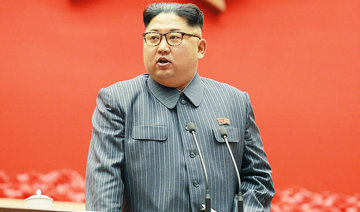BEIGING: China on Friday rejected accusations that it had helped Pyongyang skirt sanctions after US President Donald Trump claimed on Twitter that Beijing was turning a blind eye to oil transfers to North Korea.
Trump’s tweet was the latest salvo in his battle to persuade China to tighten the economic screws on Pyongyang over its missile and nuclear program, in a campaign that has seen him heap both praise and criticism on Beijing.
“Caught RED HANDED — very disappointed that China is allowing oil to go into North Korea,” Trump wrote Thursday. “There will never be a friendly solution to the North Korea problem if this continues to happen!“
The United Nations — at the urging of the US — has imposed a series of sanctions against North Korea aimed at getting it to halt its weapons development.
China has supported the moves, but critics claim it is not rigidly enforcing the sanctions, fearful that too much pressure will cause the unpredictable regime to collapse.
South Korean newspaper Chosun Ilbo, citing government sources in Seoul, reported earlier this week that US satellites had spotted Chinese ships selling oil to North Korean vessels at sea dozens of times since October.
“The recent series of reports on this situation do not conform with the facts,” Chinese foreign ministry spokeswoman Hua Chunying said, adding that Beijing did not allow its “citizens or companies to engage in any activities that violate” UN resolutions.
Hua said China had looked into the report of a Chinese ship transferring oil to a North Korean vessel and found it to be inaccurate.
“There is no record of the (Chinese) vessel visiting a Chinese port” since August, she said.
“I think making pointless hype through the media is not conducive to enhancing mutual trust and cooperation.”
A defiant Pyongyang has said there is no possibility of its weapons programs being rolled back, and that they have been developed to defend against what it terms aggression by the US and its allies.
Washington insists a resolution of the crisis on the Korean peninsula depends on the North’s denuclearization.
The United Nations Security Council last week imposed new sanctions on Pyongyang further restricting oil supplies, and ordering North Korean nationals working abroad to be sent back by the end of 2019.
It was not immediately clear what prompted Trump’s tweet, or if he was accusing China — the North’s main ally — of directly violating sanctions targeting Pyongyang.
A State Department official later said the US was aware that “certain vessels have engaged in UN-prohibited activities, including ship-to-ship transfers of refined petroleum and the transport of coal from North Korea.”
“We have evidence that some of the vessels engaged in these activities are owned by companies in several countries, including China,” the senior official said.
Separately, a foreign ministry official in Seoul said Friday that a Hong Kong-registered vessel was seized and inspected in November for transferring oil products to a North Korean ship in breach of UN sanctions.
The official described the incident as Pyongyang “shrewdly circumventing” sanctions, adding that South Korea had shared intelligence on the case with the US.
In recent months, the White House has praised Beijing for its efforts to tame North Korea, and China has voted in favor of three UN Security Council resolutions strengthening sanctions against the North.
But Washington, convinced that only Chinese pressure will persuade North Korean leader Kim Jong-Un to back down, has demanded that Beijing do more.
“China has a tremendous power over North Korea. Far greater than anyone knows,” Trump told the New York Times in an interview Thursday.
The US president hinted at the possibility of trade action against China over the matter.
“Oil is going into North Korea. That wasn’t my deal!” he said. “If they don’t help us with North Korea, then I do what I’ve always said I want to do.”
Describing Kim regime as a “nuclear menace” that is “no good for China,” Trump added that Chinese President Xi Jinping’s government has to “help us much more.”
The UN Security Council on Thursday meanwhile denied international port access to four ships — three registered in North Korea and a fourth in Palau — suspected of carrying or having transported goods banned by international sanctions targeting Pyongyang, according to the final list adopted by the world body.
Diplomats had said on Thursday that all four were North Korean vessels.
The ban of the four vessels brings the UN’s total number of blocked ships to eight.
China rejects Trump accusation on North Korea sanction breaches
China rejects Trump accusation on North Korea sanction breaches

Bangladesh takes ‘balanced approach’ with Pakistan as talks of defense deal emerge

- Air force chiefs of Pakistan and Bangladesh discussed potential defense pact last week
- Dhaka says plan to procure fighter jets still in early stages, discussions ongoing with several countries
DHAKA: Bangladesh appears to be moving with caution as Dhaka and Islamabad forge closer ties and explore a potential defense deal, experts said on Friday.
Following decades of acrimonious ties, relations between Bangladesh and Pakistan have been growing since a student-led uprising ousted former Prime Minister Sheikh Hasina in 2024.
Talks on a potential defense deal covering the sale of Pakistan’s JF-17 fighter jets to Dhaka emerged after Bangladesh’s Air Chief Marshal Hasan Mahmood Khan visit to Rawalpindi last week, where he met with his Pakistani counterpart Air Chief Marshal Zaheer Ahmed Baber Sidhu and Field Marshal Syed Asim Munir, Pakistan’s chief of defense forces.
Bangladesh’s military media wing, the Inter-Services Public Relations, said the procurement of fighter jets for the Bangladesh Air Force is “in the very rudimentary level,” and currently “under an evaluation process.”
ISPR Director Lt. Col. Sami Ud Dowla Chowdhury told Arab News: “The evaluation process will determine which country’s offer proves befitting for us. The air chief’s visit to Pakistan is part of the evaluation process … Earlier, he visited China, Italy (too).
“Discussions are underway with different countries. Nothing concrete has come yet.”
Talks between the high-ranking military officials are the latest development in Bangladesh-Pakistan ties, which have included the resumption of direct trade for the first time since the 1971 war and the expected launch of a regular route from Dhaka to Karachi at the end of this month, following over a decade of suspension.
Though efforts to expand relations can be seen from both sides, the current interim government of Bangladesh led by economist and Nobel Prize laureate Muhammad Yunus has been “showing some kind of pragmatism,” said Prof. Delwar Hossain of Dhaka University’s international relations department.
“Bangladesh is stepping very cautiously in comparison with the advancement from the Pakistan side. Bangladesh is trying to make a balanced approach,” he told Arab News.
“The present government is always saying that the development of a relationship with Pakistan doesn’t necessarily mean that Bangladesh is moving towards a particular camp. Rather, Bangladesh is interested in having a balanced relationship with all the great powers.”
Trade and economy are “naturally” more preferable areas of cooperation for Dhaka, Hossain said, adding that “we need more time to determine” how far military cooperation will be expanded.
Ishfaq Ilahi Choudhury, a defense expert and retired air officer of the Bangladesh Air Force, said that Bangladesh is “very much in need of advanced aircraft” because its military has not procured new fighter jets in at least two decades.
“Air frigate fighters are badly needed for the Bangladesh Air Force. We had some F-7 produced by China, but they stopped producing these fighters nowadays. Here, Pakistan can be a source for our fighter jets, but it involves … geopolitics,” he told Arab News, alluding to how Dhaka’s defense ties with Pakistan may be perceived by its archrival neighbor India.
Pakistan’s JF-17 fighter jets, a multi-role combat aircraft jointly developed with China, have drawn international interest following their success last May, when Pakistani and Indian forces engaged in their worst fighting since 1999.
Islamabad said it shot down several Indian fighter jets during the aerial combat, a claim Indian officials later acknowledged after initially denying any losses, but without specifying the number of jets downed.
“Our friendship with Pakistan shouldn’t (come) at the cost of our friendship with India,” Choudhury said.
“With this (potential) defense purchase deal with Pakistan, we have to remain very cautious so that it proves sustainable in the long term.”













